- Home
- Aimée Thurlo
Second Sunrise Page 2
Second Sunrise Read online
Page 2
Lee was spun around as if struck by the horn of a charging bull. The pain was instantaneous and hotter than a branding iron. Lee was surprised he could still see and think as he lay there on the ground, but one glance told him the man with the shotgun was out of action for good.
“Hey, buddy, you still there?” the soldier in the weapons carrier called out. His voice sounded faint now, and Lee realized that the G.I. was probably wounded as well.
Lee managed to sit up. His side was wet with blood and ached like sin, but at least he could move. Getting to his knees, he found his rifle and levered in another round.
Swallowing hard, he pulled himself together, loading more cartridges into the rifle while he had the chance. He wanted to answer the soldier, but to do so now would reveal his position. His side screamed out in pain, worse than the time the mustang had broken three of his ribs.
“We were ambushed. I’ve been hit, hut I’ll cover you,” the Texas boy yelled, his voice giving way to a wet-sounding cough at the end. “Check across the road.”
Lee remained hidden, searching back and forth for signs of movement, or someone else with more patience waiting him out. But the soldier down in the Dodge was sounding pretty rough now, and Lee knew he needed medical attention.
Inching forward a few steps at a time, then stopping behind cover to watch, Lee checked out his side of the road carefully. He found another attacker’s body riddled with bullets. As his angle of view changed, Lee spotted another soldier crumpled alongside the cargo truck, a carbine on the road beside his body. This soldier was probably lucky enough to take someone with him when he died.
Lee was numb now, not so afraid of dying anymore. If he was going to face death, it was going to be as a warrior, not in his sleep or in a head-on collision.
He moved in a crouch down the slope and onto the road, keeping his Winchester at his shoulder, ready to react and fire if he heard a sound. As he approached the wounded soldier, he called out softly. “I’m a New Mexico state patrolman, soldier. I’ll get some help for us.”
CHAPTER 2
Lee climbed up the slope on the tar side, found another dead attacker, and saw two more dead G.I.s who’d tried to get off the road and apparently encountered this man. The first man Lee had shot, the sniper with the bolt-action rifle who’d killed Benny, was lying there, motionless. Nobody could survive a bullet to the brain.
“Don’t shoot. I’m coming over,” Lee yelled, then stumbled back down onto the road. Up close he could see that the weapons carrier was riddled with bullet holes and reeked of gasoline. At least the flare, which had died down now, was fifty feet away and a slight breeze was dispersing the fumes.
The olive-drab canvas top was holed like Swiss cheese. A prone, light-haired young man with a bloody streak across his face peeked over the punctured side-mounted spare tire. Lee could see the stubby barrel of the weapon he’d heard others call a grease gun. “Lucky you have that black uniform on. The first bastard you hit was a crack shot.” He coughed and a trace of foamy blood leaked from the side of his mouth.
Lee leaned his Winchester against the side of the spare tire, and took a step closer. The solider had two silver bars on his shoulder and that made him an officer, but he wasn’t more than twenty years old, if that.
“Captain, do you have a first-aid kit?”
“First Lieutenant Billy Ray Barnett, from Amarillo, Texas. I’m way past first aid.” His accent was less noticeable with his voice just a whisper now. He coughed again, then wiped his mouth with a sleeve. “Any G.I.s make it?”
“I don’t think so.” Lee hadn’t heard or seen movement from any of them. “I’ll take a closer look as soon as we fix you up.”
“Our cargo . . . in the six-by. It can’t fall into their hands. Take it away and bury it. Germans tried to get us to surrender. Said they had reinforcements on the way.” Lieutenant Barnett gasped, coughing again, spitting up blood.
“These weren’t hijackers, were they?” Lee looked down the road in both directions. No headlights were visible.
“German spies . . . after what we’ve got in the truck. New secret weapon. Very dangerous. Up to you, now. What’s your name, Officer?”
“Patrolman Lee Nez, Lieutenant. You said your attackers were expecting reinforcements?”
“Could have been a lie, but they must have a vehicle nearby, and maybe a driver. Can’t let them take our cargo.”
Barnett coughed, his body shaking, and Lee thought he was going to die right then. Finally the lieutenant looked up again, his eyes tired. “Must be a traitor, or somebody talked. They knew to hit us tonight. Hide the gray metal box where it can’t be found. Bury it to keep it safe. Don’t open the box. Too dangerous.”
“You come with me, sir. I can’t leave you.” Lee reached for Barnett.
“No. I’ll stay here with my men. If more Germans show up, I’ll keep them busy. Just go . . .”
The lieutenant gasped once, and the light in his eyes faded.
“Barnett?” Lee recognized the glazed look, he’d seen it in accident victims. As a Navajo, he’d always been taught that when people died, they left their chindi, the evil part of them behind, and that ghostlike presence was dangerous no matter how good the person had been when alive. Even Benny Mondragon . . .
Standing, he looked around once more, knowing that it there really were chindis, he was standing in a whole crowd of evil beings. Reaching into his pocket, he touched his medicine pouch. The corn pollen and special stones within had always protected him, and he assumed that would be true now as well. But it was better not to put it to the test. He had to go, and unless he completed the task the dying officer had given him, he knew there was one chindi that was going to be out to kick his ass. These G.I.s, and Officer Benito Mondragon, weren’t going to die for nothing.
Holding his side, Lee walked over to the cab of the GMC.
Ten minutes later, Lee was driving west in the big deuce and a half, as the two-and-a-half-ton ten-wheeled cargo truck was nicknamed. Dizzy now from loss of blood, he was going as fast as he dared with the lights out, hoping that he’d bypass and outrun the rest of the Germans even if they’d been hiding farther west.
He’d found a first-aid pouch with dressings in the cab of the truck and bound up his wounds as best he could, but there were six or seven angry buckshot holes, and they continued to bleed. He knew there were some small caves off the road beyond Thoreau, a small community mostly north of the highway. If he could find a hole, he’d hide the secret weapon . . . if he could hang on.
Lee woke with a start when the truck hit a rock, and realized within the haze that he’d drifted off again. He vaguely remembered having hidden the box in a small cave or animal den beneath an overhanging cliff somewhere back there, and filling the hole with rocks and dirt. But right now he was exhausted, too weak to sit up without leaning into the steering wheel.
He tapped the brakes, and the truck slowed nearly to a stop, still in low gear. The highway was just ahead, clear in both directions. He turned west onto the asphalt, managing to find the next gear. It would be at least an hour before he reached Fort Wingate.
Soon he lost track of time again, his eyes opening and closing and his arms so weak he was barely hanging on to the steering wheel. Lee knew he wouldn’t make it. He might as well just pull over to the side of the road. At least nobody else would run into him or, worse, get hit by the heavy truck.
Then Lee remembered that a member of his clan, a Navajo medicine man or hataalii everyone called Bowlegs, lived just off the highway somewhere near here. He pulled off the road, trying to think of where he was now. Noting the width of the valley to his right, he decided that Bowlegs lived in the other direction.
Bowlegs could be trusted to tend his wounds, and might even be able to hide the truck. Even in his hazy present condition, Lee still knew the road between Grants and Gallup like the back of his hand, and the hogan of Bowlegs was just five minutes back east. He’d passed it a while ago. If he’d been thinking
clearly, he would have headed there before and saved himself some time.
Struggling to stay conscious, Lee turned the truck around, then shifted into low to urge the powerful vehicle up the steep hill. Beyond was the medicine man. He served many Navajos in the Fort Wingate area, and not only healed the spirits of the Dineh, the Navajo people, but also their bodies.
The truck was finally gaining speed again as it reached the crest of the hill, and Lee was looking ahead when he suddenly noticed a car in the middle of the road. Lights started flashing, and Lee realized it was some kind of policeman.
Lee slammed on the brakes, and the truck skidded another fifteen feet before stopping just an arm’s length from the black car. It had to be a cop from Gallup.
Breathing a sigh of relief for the first time in what seemed like hours, Lee leaned out the window. “Military convoy was ambushed. My partner is dead. I need your help.”
Then he recognized the black Chevrolet. It was his own patrol ear.
Lee fumbled for his Colt. Someone leaped out of the dark like a mountain lion and grabbed him by the neck, pulling him out the open truck window as if he were a rag doll, then tossing him to the pavement. As Lee gasped for breath, trying to sit up, the man searched the back of the truck, then returned.
“What did you do with the big gray box that was in that truck, policeman?” The man gripped Lee by the collar and shook him roughly.
The man was tall and slender, and the clothes looked familiar, especially the cap. A dark stain ran down the man’s nose, and was smeared along his chin. The man’s eyes were so light they nearly glowed in the moonlight. Then Lee’s heart nearly stopped. “Chindi! You’re dead. You killed Benny.” His voice strained as he struggled to speak past the iron grip of the supernatural being now holding him.
“You’re Indian, aren’t you, cop? Afraid of ghosts?”
The voice was mocking, just as he’d expected from a ghost. He’d never believed much in the stories about evil spirits of the dead, but now one was staring him right in the eye. He tried to break loose, but he couldn’t even get his arms free. The chindi had supernatural strength.
“You are dead. Chindi, get away from me! I have strong protection. Flint!” Lee groped around for his medicine pouch.
“I’m much more than a ghost, Indian, and I can pull your arms off if I decide. And I just might do that if you don’t tell me where you took the cargo from that truck.”
Lee couldn’t draw in a full breath. His side was on fire and everything around him seemed to be fading away. He would pass out soon, then he’d die. The German chindi wouldn’t get a thing from him. “Go fuck yourself,” he said, and as the darkness began to close in on him, he waited for oblivion.
CHAPTER 3
You’re not dying on me yet,” the chindi said, shaking him. “What in the hell did you do with the cargo the G.I.s were transporting?”
Lee opened his eyes, and the German chindi was less than a foot from his face. He could smell coffee on the creature’s breath, for some reason, but his other senses were about to leave him. His whole body felt numb and cold. He was going to die. Accepting it became freeing. If he was going to die, at least he was going out honorably as a Navajo warrior.
“I shot you in the forehead. You can’t be human.” Lee knew the being was supernatural, and his strength and speed were unbelievable.
“Okay, I’m a shindy, if that makes you happy. And I will pull you apart like a rag doll unless you tell me what you did with that box! Where in the hell did you go in that truck?”
The evil one grabbed Lee’s arm, and squeezed it like a vise. Lee bit his lip, refusing to scream. “What does it take to kill you?”
The evil one spoke softly. “You’ll never know. Now tell me, you pathetic weakling, before I start removing your fingers, one by one. Where did you put the box?” He moved so quickly, his arm was a blur as he grabbed Lee’s hand. There was a crack, and Lee passed out.
Someone was shaking him roughly, and Lee awoke from the fog again, his hand numb and his head throbbing. It was like a nightmare that wouldn’t end. Through the slits his eyes had become, he looked down. His fingers were still there, but two were at a strange angle. He barely remembered where he was, and couldn’t really believe what was happening. The chindi was still there, holding his sides in an iron grip. “I’ll die before I tell you anything. Get it over with.”
“Stubborn ass. Where is the box? Tell me, and I’ll let you live.”
Lee was drifting and the chindi’s words seemed distant. He couldn’t remember exactly where he’d buried the box even if he wanted to, he’d been half conscious at the time. “I’m going to die anyway. Screw yourself.”
“Tell me where you hid the box, and I can do more than save your life. I can make you immortal. But we’re running out of time. Somebody will be coming down this road soon, and I’ll have to kill them too. What if it’s a family, with little children? Maybe even a baby?”
“What if it’s a company of G.I.s armed with automatic weapons and hand grenades? That’s more likely after what you did.” Lee smiled. “That kind of firepower might even kill a master-race chindi.”
The chindi cursed, and lifted Lee off the ground by his belt with one hand. It was clear that the evil one was incredibly strong. “If you don’t tell me where you hid that box, I’ll squash you against the side of that truck like a mosquito.”
“Go to hell,” Lee uttered softly. The darkness was upon him now, and he closed his eyes, releasing his spirit.
Lee awoke feeling as if he’d been on a weekend bender. His mouth had a funny taste and his head was spinning—the kind of dizziness that wouldn’t stop until he had one foot planted on solid ground. The little trick, nothing more than a psychological anchor, was surprisingly effective.
He was on his back. When he opened his eyes, everything had a gray cast, something like on a cloudy day. But he couldn’t see any clouds in the sky and the moon was still out. There were even stars, and they seemed bright and clear. He looked around and noticed a cottontail by the road fifty feet away, eating some tall grass nourished by the runoff.
He’d been moved away from the highway to a more secluded spot. His car was there and so was the truck, both parked out of view from the highway. The German—was he really a chindi—was standing some distance away, looking toward the east anxiously, holding a pistol in his hand. His pistol, probably.
Lee looked down at his wrist, and saw he’d been sliced open like a melon. But there was no blood coming out, and the cut seemed to be closing, the edges of his skin knitting back together right before his eyes. If he was dead, at least he felt better now. He felt great, actually, and was getting stronger by the second. It was as if he’d gone to sleep a boy and woken up as a man.
If he was a chindi now, it seemed like a good trade over the slow death he’d been experiencing. He checked his wrist again, and it was nearly healed, with only a small scar. He wiggled his fingers. They didn’t look or feel broken now, and his side no longer throbbed with pain.
Since he was in pretty good shape for a dead man, maybe it was time to turn the tables on the German. There was no way he was going to hand anything over to a German agent—chindi or not. Even ghosts were at war. He remembered the Texas soldier telling him that gray box contained some kind of powerful weapon.
He still couldn’t remember exactly where he’d hidden the heavy thing, but he knew he could probably find it by backtracking. He wasn’t about to do that for the German, though, even if he was a chindi too.
The puzzling thing was, if the German was the evil part of a man who’d died, then he should be evil too, and he didn’t feel that way at all. What he did feel was anger toward whatever it was that had killed Benny, and himself as well, apparently.
Lee pretended to struggle a bit as he sat up, hiding his strength. The chindi was extremely powerful, like a bear, so he figured the only strategy that might work against him was a surprise attack. The German noticed his movement immediately. Th
e speed and grace of the creature’s approach was surprising, like that of a big cougar.
“You’re alive again,” the evil one said. “You died, so I brought you back by mixing my blood with yours. But I can kill you again, a dozen times or more, each time after hours of torture. Tell me where you hid the weapon in that box, and I might let you keep living.”
“If I’m really alive, I’m not a chindi. So what am I? What are you?” Lee wanted to stall as long as he could, building his strength.
The German creature smiled grimly. “Just take me to that box you hid. Maybe I’ll tell you on the way.”
Lee tried to clear the cobwebs from his brain. The chindi belonged to the Navajo culture. This man or creature was from Europe. He tried to think of any folklore that might explain how the German could do this, and all that came to mind was the story of vampires. Was that just in books and movies? Maybe the teachings of his people could help now. The Dineh believed that to know a person’s name was to have power over him.
“What’s your name?”
“I’ve been a hundred people but, for now, my name is Hans Gruber.” He drew Lee’s .45 Colt revolver out of his big jacket pocket. “You already know that bullets don’t normally kill men like me—but they hurt like hell and can incapacitate you for a while. You won’t die, but you may wish you could.” He trained the weapon on Lee. “Take me to the place where you hid the plutonium, the radioactive material in that gray box.”
“Maybe we should wait until daylight.” Lee wanted to see his reaction.
“Ah, now you’re catching on.” Gruber’s eyes seemed to light up, and his sneer was close to a smile. “But your stalling is over. Get behind the wheel of the truck and let’s get going. I’ll ride ‘shotgun.’ ”
A few minutes later, Lee was driving west down the highway, knowing that Hans had seen him coming from that direction earlier. He had a plan now that might give him a chance to survive.

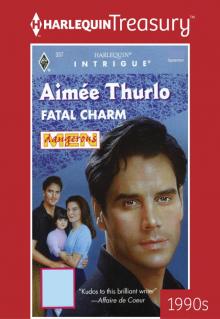 Fatal Charm
Fatal Charm Christmas Witness
Christmas Witness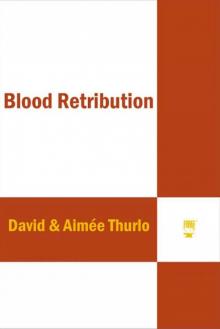 Blood Retribution
Blood Retribution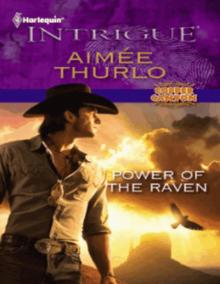 Power of the Raven
Power of the Raven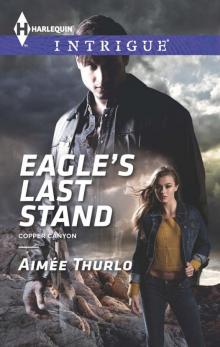 Eagle's Last Stand
Eagle's Last Stand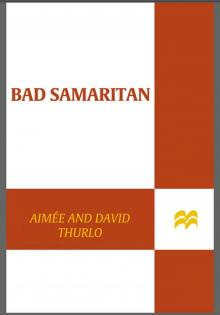 Bad Samaritan
Bad Samaritan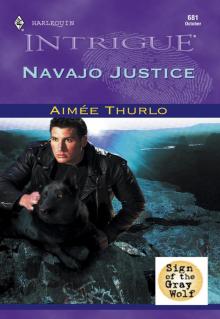 Navajo Justice
Navajo Justice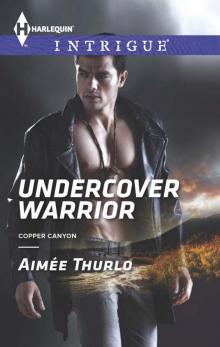 Undercover Warrior
Undercover Warrior Wind Spirit: An Ella Clah Novel (Ella Clah Novels)
Wind Spirit: An Ella Clah Novel (Ella Clah Novels)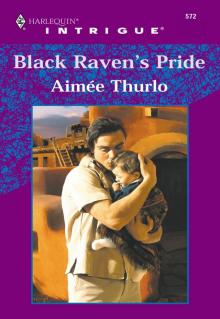 Black Raven's Pride
Black Raven's Pride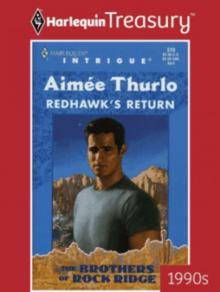 Redhawk's Return
Redhawk's Return Second Sunrise
Second Sunrise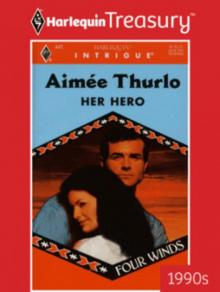 Her Hero
Her Hero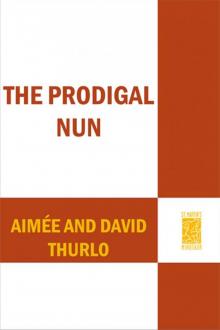 The Prodigal Nun
The Prodigal Nun Her Destiny
Her Destiny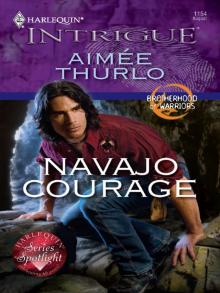 Navajo Courage
Navajo Courage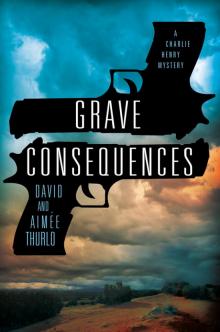 Grave Consequences
Grave Consequences Homespun Christmas
Homespun Christmas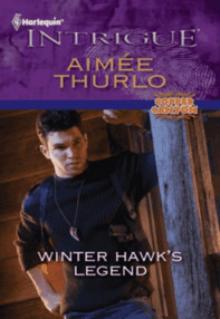 Winter Hawk's Legend
Winter Hawk's Legend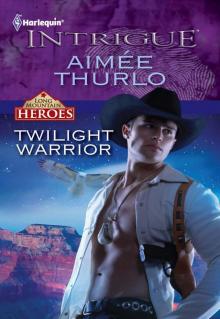 Twilight Warrior
Twilight Warrior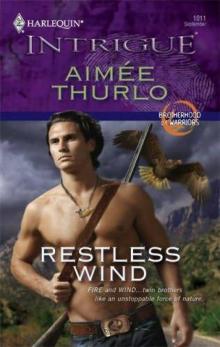 Restless Wind
Restless Wind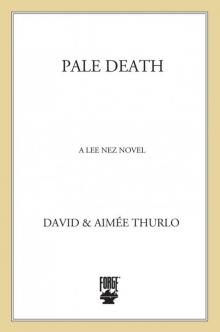 Pale Death
Pale Death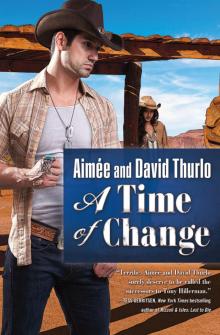 A Time of Change
A Time of Change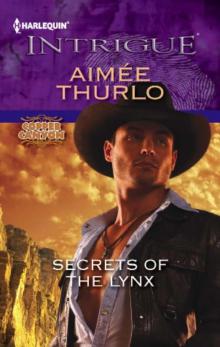 Secrets of the Lynx
Secrets of the Lynx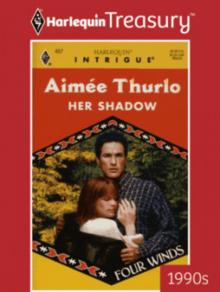 Her Shadow
Her Shadow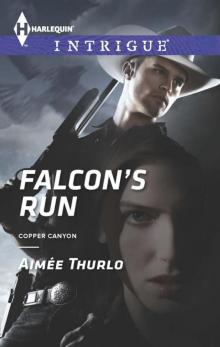 Falcon's Run
Falcon's Run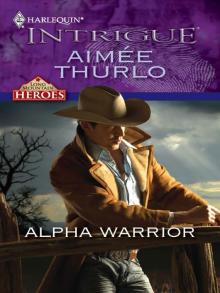 Alpha Warrior
Alpha Warrior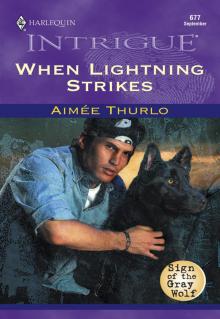 When Lightning Strikes
When Lightning Strikes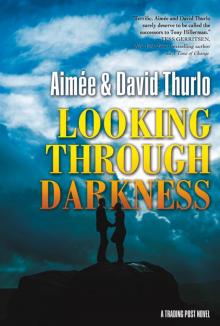 Looking Through Darkness
Looking Through Darkness